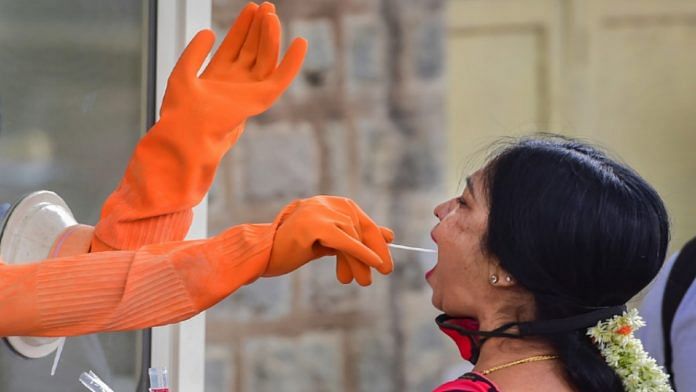New Delhi: Despite predictions of “doomsday” for India, the country has made “monumental strides” in handling the Covid-19 pandemic, the Indian Council of Medical Research (ICMR) has said.
In an editorial of its 12-paged monthly internal newsletter e-Samvaad, the country’s apex medical body has hailed its efforts in handling the outbreak despite challenges.
The editorial, titled ‘A year-long stint of India with COVID-19: challenges and achievements’, was carried in the January edition of the newsletter that was published Wednesday.
The ICMR in the editorial recounted that India had “negligible” laboratory capabilities when it reported its first coronavirus case in January 2020.
“We were faced with a highly contagious virus that mandated physical distancing as prevention and as such speculators predicted doomsday for India,” said the editorial.
One year down the line, it pointed out, “Covid-19 related fatality and number of cases has drastically declined from its peak and India has launched the world’s largest vaccination drive using two Covid-19 vaccines, which were approved for emergency use.”
From starting a multi-centre trial on plasma therapy to conducting national serological surveys or devising the 5T (test, track, trace, treat and technology) strategy to control the pandemic — the ICMR has listed several achievements in the editorial.
But it also emphasised that the work is still incomplete as the pandemic continues.
“While we have made monumental strides, there is still some distance to go before we can rest. As we embark on the last leg of this journey, we must remain Covid-19 conscious, optimistic and forward-looking,” it said.
ICMR director general Dr Balram Bhargava, who is also the secretary in the Department of Health Research under the Health Ministry, is the patron of the newsletter.
Also read: Slow vaccination deliberate, will soon rise to 70 lakh/day from 5 lakh: ICMR task force member
Monitoring development in other countries on virus strains
With regard to the mutated variant strains of SARS-CoV-2, the ICMR said it has been constantly monitoring the developments in other countries.
The editorial said that “when a case of UK variant was reported, India was the first country to isolate and culture the UK variant of SARS-CoV-2 from the clinical specimens collected from UK returnees”.
In fact, “it was also found that ICMR-backed Bharat Biotech Limited’s indigenous vaccine, ‘Covaxin’, is effective against UK strain,” it added.
In another chapter of the editorial, titled ‘Achievement’, Dr Samiran Panda, head (epidemiology and communicable diseases division), ICMR, explained that the UK mutant variant is highly transmissible, but it may not lead to more deaths.
He said that “high transmissibility of SARS-CoV-2 does not necessarily go hand-in-hand with high virulence”.
“A symbiotic relationship evolves over a period of time in which a virus goes from an epidemic existence to an endemic one and with less virulence potential. However, we need to be vigilant,” the editorial said.
Serological survey, multi-centre trial on plasma therapy
According to the editorial, the ICMR carried out a multi-centre randomised controlled trial on plasma therapy when it was being regarded as a treatment for Covid-19 despite lack of conclusive clinical evidence.
“…based on its results, it was concluded that convalescent plasma played no significant role in preventing deaths or progression to severe Covid-19 disease.”
It credits itself for several other moves, including establishing a National Clinical Registry for Covid-19, which allows collection of real-time systematic data. The registry helped the government devise an effective treatment protocol.
“Critical data was compiled on clinical signs and symptoms, laboratory investigations, management practices followed, clinical course of Covid-19 disease, disease spectrum and outcomes of patients.”
Highlighting its work on conducting national serological surveys, the ICMR said these surveys helped to “detect the prevalence of SARS-CoV-2 for improved tracking and tracing”.
“Based on the results, researchers highlighted the need to continue to implement the context-specific containment measures. These findings helped to plan and revise testing strategies and recommend the same to states, so that they can focus on limiting Covid-19 cases in specific areas of their respective states.”
Also read: ‘People are behaving like Covid is over’ — what Maharashtra blames for sharp spike in cases




All those western journalists of ‘reputed’ newspapers, who predicated doomsday in India due to Covid, should now be name shamed.k